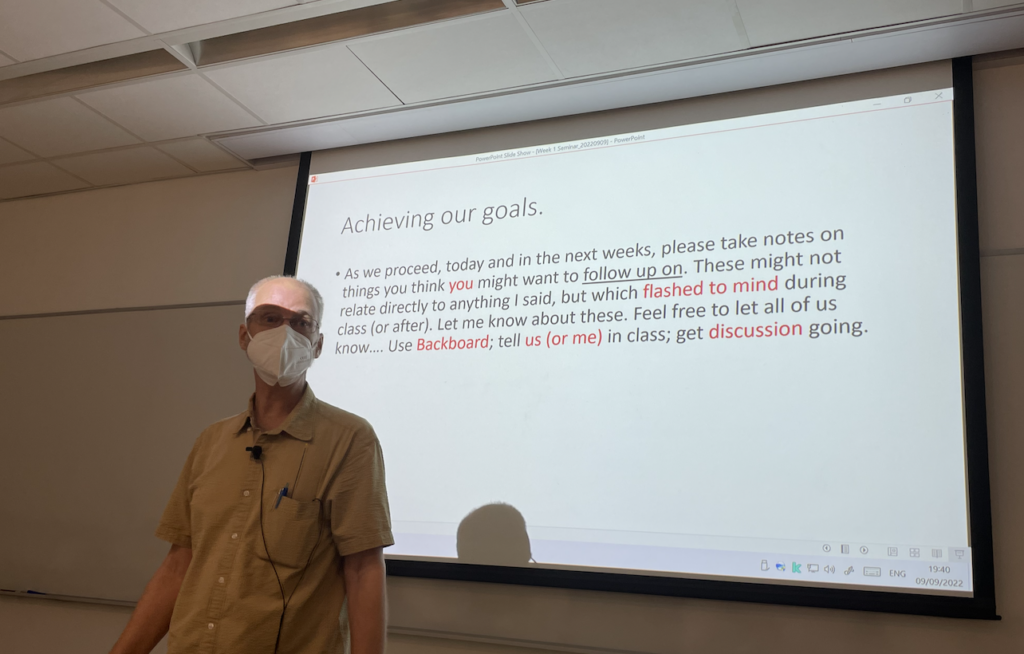在大学重新学习「学习」
来学校一周了,重新体验当学生的感觉,有很多新鲜强烈的刺激值得记录下来。
来之前觉得一个学期一周只有四节课,轻轻松松。我有很多时间玩、旁听别的专业的课,或者探索香港。但是一周听下来最大的感受居然是跟不上。居然是「跟不上」!你敢信?上完第一周有朋友邀请我去香港故宫看展、去看电影、去爬山,我的反应都是:“reading读不完啊,先不去了吧…..” 现在见面朋友们问我首先是,“今天在干嘛,读reading嘛?“
最大的刺激首先是来自这里的上课方式,或者说是graduate school的学习方式。真正把你当成一个adult一样成熟的人去「对话」,而不是「我教你」,用讨论和交流的方式来学习。Exchange of ideas is the foundation of learning。
这就要求你必须在「对话前」有自己的想法,在对话前思考、感受、困惑,才会有对话发生。这就意味着:每堂课你的学习过程不是在课堂上才发生,而是在课前。
而课堂上当然也有学习,是在交流和对话中的互相刺激,在交换彼此间思考和经验中的学习,但那个最主体的部分是你独自进行的自我学习。means 如果把一堆生的食材加工成一盘自己风味的菜这个比喻的话,是你自己消化完这节课的raw material,你已经自己消化过炒了一盘菜,大家上课来互相尝一尝彼此菜的味道,然后学习怎么做得更好。(第一节课教授说,厨师是一门非常有创意的工作。如果你什么都没有做,你两手空空的来到课堂,你没有东西跟别人交换,你也就没有进入这个互相学习的过程里。
而当我说我「跟不上」的时候,我指的是我不能自信和自在的在课堂上理解他们在说什么,而我又可以怎么大方的回应他们?我感觉自己没有跟上这个学习的节奏。我发现我「加入不进他们的对话里」,这让我又急又气。
我发现之前想象的在我读大学时那种到点去听课,听老师随便讲一讲,自己随便看一看,然后到了期末就去临时抱佛脚的学习方式是很轻浮的。我不记得我在大学的时候有对哪个老师特别印象深刻,或者感到inspired。可是在中大的课堂上,我会需要不停去激发自己。我会时时刻刻处于一种紧张的激活的状态,如果我不是这种激活状态而是一种松松垮垮的状态,我就会完全Lost,我就会完全加入不到对话里面去。
「加入到对话里,respond to others」,这是我在 cuhk 研究生课堂上学习到的学习方法。我在这个中秋假期又把每一节课的syllabus都重新读了一遍,里面对学生要求的部分我觉得恰好能去阐述如何在研究生阶段学习「学习」这件事,收集摘录一些:
- Participation: As this is an MA-level class, it is expected that you keep up with the readings and come to class prepared to discuss them. Exchange of ideas is the foundation of learning。
Your comments demonstrate that you have read the assigned readings and have an excellent understanding of the class material - Reading notes For 10 weeks (Week 2 – 11), you will need to submit a reading summary and analysis of the assigned readings. Notes should be no longer than 400 words and submitted to me by email BEFORE the class. Name the articles and authors; explain key arguments and ideas; provide a personal opinion.
Your notes show a nuanced understanding of class material and all concepts; information is factually accurate; arguments are convincing. - Class presentation In one week of your choosing, you will lead a discussion of the assigned readings, by generating two discussion questions and illustrating the discussed concepts with a real-world example of language in use (a video from YouTube, a social media post, a newspaper article, a podcast excerpt, an interview transcript, etc.).
Your discussion questions are sharp and relevant, the chosen example is excellent, and your presentation is coherent, engaging, and factually accurate
1. Tutorial Participation
Every student is expected to be an active member in class and in contributing to a meaningful learning experience. Listening carefully to others, raising relevant questions, posing alternative interpretations, bringing in outside material to enrich class discussion via conference or other means are just some of the way to do so. How ready and conscientious you are in class will directly affect how much the whole class could gain from the course.
2. Tutorial Facilitation
Your job is to raise critical questions and lead the class to discuss particular issues that your group finds important. Feel free to bring in outside material – news story, case studies, film clips – and use a variety of formats – role play, debate, games etc – to help your fellow students learn. As facilitators, it is important for you to think through these exercises carefully before coming to class, planning it step by step with clear instructions. You have 20 minutes for class facilitation.
3. Learning diary
A Learning Diary entry should be a reflection on the lecture and/or tutorial. It is a concise piece of academic writing that includes your reflection on one key message of the material covered in the class, how you understand its importance, and how it challenges/changes your ideas.
It should be a structured piece of writing that includes an Introduction, a Body, and a Conclusion.

Your comments – Your notes – Your discussion questions
把课前课上分为两条线: 课前:提前reading!- take notes -summary/ analysis 课上:listen to other- 随时comment- raise question- enrich class discussion 读书做笔记,提问评论参与讨论。激活激活。